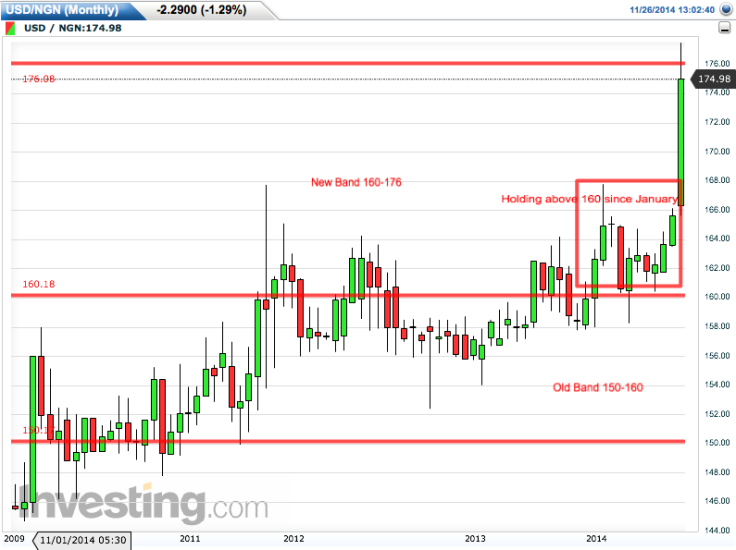Nigeria's Naira Recovers a Little After Central Bank Raises USD/NGN Target Band

Nigeria's naira improved a little from the record lows after the central bank surprisingly devalued the currency and increased the benchmark interest rate, in order to save its foreign reserves amidst a steep fall in oil prices.
USD/NGN traded at 175.00 on Wednesday compared to 177.00 where it traded prior to the central bank move.
The Nigerian central bank also raised the benchmark interest rate to 13% from 12%, in order to curb inflationary pressures stemming from a weaker local currency.
The bank moved the USD/NG target band to 160-176 naira from 150-160 previously.
"Falling oil prices have consistently reduced the accretion to external reserves, thus constraining the ability of the bank to continually defend the naira and sustain the stability of the naira exchange rate," said Godwin Emefiele, the central bank governor.
Nigeria's foreign reserves have shrunk by 18% to around $37bn in less than a year. Nigeria earns its foreign reserves mainly from oil exports.
Moody's had lowered its price assumptions for various major crude benchmarks on Tuesday citing the 25% drop in oil prices since June this year.
Moody's assumes the Brent crude, a proxy for the world market, at $80 per barrel for 2015 and to $85 per barrel in 2016. The WTI crude, a proxy for North American production, is assumed at $75 per barrel in 2015 and $80 per barrel in 2016 and thereafter.
The Currency Band
The USD/NGN pair has been, in fact, holding above 160 for nearly a year now. And it has hit the upper end of the new band a few days before the central bank decision.
It was in November, the currency weakened the most in the recent past; so far in the month, the naira has fallen more than 5.7% against the greenback. It was in July 2009, the currency made bigger losses, when it ended the month 6.4% down.
Some History
The central bank move is not new. It had done the same exactly three year ago. Then the band was raised to 150-160 from 145-155.
The rate hike was done in the previous month, that is, in October 2011, and it was a big surprise move of 275 basis points.
The central bank then cited prolonged naira weakness and high dollar demand as reasons for the move.
© Copyright IBTimes 2025. All rights reserved.




















